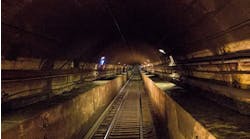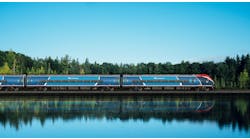April 06--A pro-union coalition is suing Sound Transit in federal court, after the agency refused to display ads about low-paid airport workers, on Link trains to Seattle-Tacoma International Airport.
Working Washington filed the case Wednesday in U.S. District Court in Seattle. The complaint alleges violation of First Amendment free-speech rights and seeks a judge's order to have the ads displayed.
Sound Transit prohibits 18 kinds of ads, including political and religious advocacy.
The rules say ads will be allowed that sustain "a safe and welcoming environment for its customers, and maintaining a position of neutrality on political, religious and controversial matters."
Working Washington bought about $6,300 in ad space, or three per railcar on the light-rail line, said spokeswoman Thea Levkovitz.
They show three pictures: a Champagne glass as "first class," a seating cabin as "coach class," and skycap Hosea Wilcox representing "poverty class," alongside the message: "Let's make all airport jobs good jobs."
Wilcox, who works for an airline's contractor, says that after 31 years of bringing "the human touch" to passengers, his hours were cut so much that he has been using food stamps. He spoke at a news conference Thursday at International District/Chinatown Station.
Sound Transit spokesman Geoff Patrick said the agency's ad rules will survive legal challenges so long as they are applied equally to all groups or sides of an issue. Far from being anti-union, the transit board's contracting policy assures $9.5 billion in rail projects will be built by union labor, he said.
The flap follows a 2010 argument when King County Metro Transit declined to show ads alleging war crimes in the Israeli-Palestinian conflicts — citing concerns passengers might be at risk from violent reaction. Metro then banned all political ads.
Patrick said, "If you open the door to political or controversial ads, you lose the ability to exercise much discretion over what ads you do or don't run."
Sound Transit's policy, dated July 29, 2011, also prohibits ads that contain profanity or violent images; disparage individuals or groups of people; depict alcohol, tobacco, firearms, nudity or X-rated services; or are libelous or misleading.
Working Washington says one of its own issue ads appeared last fall, called "Our Bridges Need Work -- So Do We," before its march (alongside Occupy Seattle) to the University Bridge on Nov. 17.
Working Washington plans an April 28 rally at Sea-Tac to include hundreds of food-service workers, aircraft-cabin cleaners, skycaps, shuttle drivers, cargo workers and others.
Mike Lindblom: 206-515-5631 or [email protected]. On Twitter @mikelindblom.
Copyright 2012 - The Seattle Times

